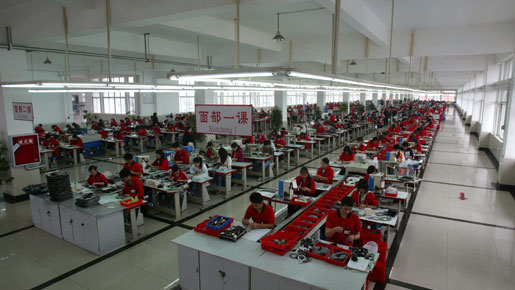
Trade disputes between Brussels and Beijing are on the rise since the EU’s trade deficit with China has ballooned, hitting 160 billion euros ($249 billion) last year.
But the case involving fasteners, which are widely used as components for cars, white goods or machinery, is probing deeper into manufacturing practices in China and could cause new friction in one of the world’s biggest trade relationships.
“Just in Italy, quite a few of our companies won’t see the end of 2008 unless something is done,” said Giorgio Donati, commercial director of Fontana Luigi, a maker of fasteners based near Milan.
He was one of several representatives from companies around the EU, including Britain, Sweden, Poland, Spain, France and Belgium, who met in Brussels this month to press their campaign for anti-dumping duties to slow Chinese imports.
Those imports have soared to grab nearly 30 percent of the EU’s 4 billion-euro market in fasteners, up from 9 percent as recently as 2002, the European manufacturers said, bristling at suggestions they were no longer competitive.
“We don’t have all the answers to prove it but when you get products exported to Europe at a price below the cost of raw material, and the price of raw material is the same (around the world), it must be a matter for consideration,” Donati said.
China routinely denies it breaks trade rules and says Europe resorts to protectionism against its low-cost advantage.
Steel subsidies?
In the screws case, EU trade experts believe Chinese exporters get an unfair edge because of suspected subsidies in China’s steel industry that gives them cheap raw material.
For that reason, Brussels has rejected requests from a dozen Chinese fastener makers for the EU’s “market economy” treatment, which would have reduced their chances of being hit with heavy anti-dumping duties, people familiar with the case said.
Without market economy status, the EU uses other countries to judge the costs of Chinese companies, such as India or Brazil where prices are usually higher, making a finding of dumping almost inevitable in many cases, trade specialists say.
The EU, like the United States, does not consider China to be a market economy, saying the state still plays too big a role in areas such as banking and industrial policy. But it does consider offering exceptions to firms on an individual basis.
Chinese officials protest that the EU cannot prove its suspicions about illegally priced steel as it only launched a separate dumping investigation into Chinese steel wire rod in early May.
“This methodology is totally wrong,” a Chinese trade official said. “They have crossed the line. Anti-dumping investigations should be concerned with one product. You cannot say the wire rod prices are too low and punish fasteners.”
China is also worried that Brussels may be more lenient to three European companies producing fasteners in China.
An EU official said the suspicions of artificially low steel input prices has so far affected only the decision to reject the Chinese screw exporters market economy treatment and no decision has been taken on whether they should pay anti-dumping duties.
But the EU seemed to be creating a precedent that would make it easier to hit exporters of machinery or cars, for example, with duties on the grounds that they too use steel or components considered to be subsidised, the Chinese official said.
The EU is in the process of investigating a broad range of primary steel made in China, adding to nervousness in Beijing about the possible knock-on effect of dumping decisions.
Broader negotiations
European trade chief Peter Mandelson is likely to decide in June whether to recommend hitting Chinese fasteners with duties on a provisional basis, the people familiar with the case said.
That decision will be put to EU member states which have split acrimoniously over previous dumping cases.
Applying duties would be a blow to Europe’s importers and distributors of Chinese fasteners who say it would push up prices to little gain for EU manufacturers who were suffering against low-cost exporters in Turkey and Taiwan before China.
It could also affect slow-moving negotiations between the EU and China for a new umbrella trade and investment agreement, possibly sending a tough signal from Brussels as it tries to persuade Beijing to speed up the modernisation of its economy and open up more to foreign investment and competition.
As Brussels prepares its decision on the fasteners case, Europe’s manufacturers say they are running out of time.
They want the EU to impose duties that could more than double the price of Chinese fasteners.
“If the situation is not re-established in terms of fair competition there will be many companies that will be obliged to close down,” Donati said.

